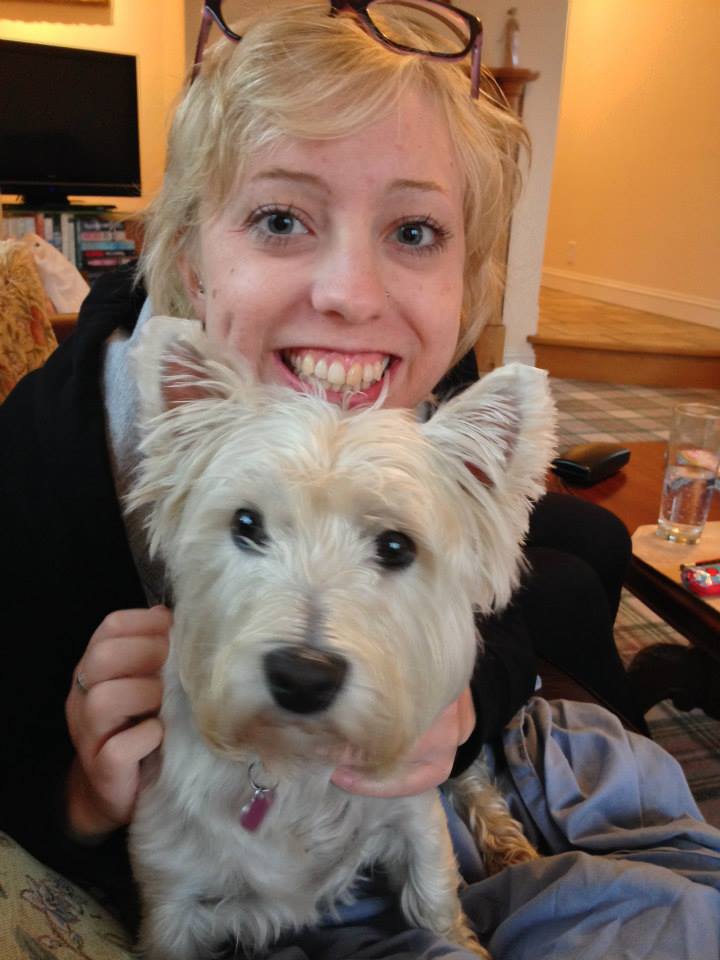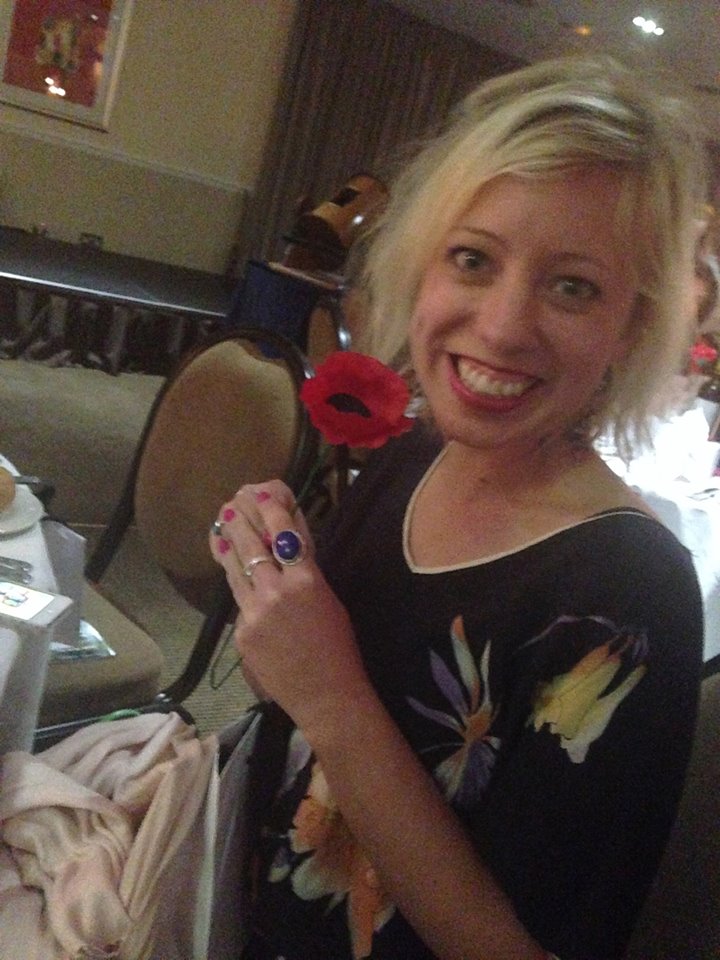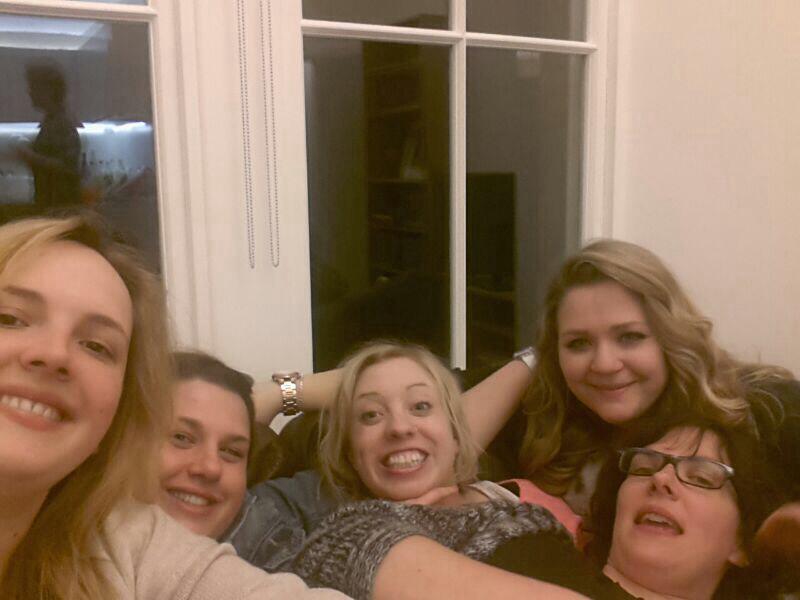On Thursday 4th September 2015, Kirsty Bailey - founding member of this blog, and dear friend to so many of those associated with it – died. Her passing was peaceful and followed a long and difficult battle with cancer – a battle she wrote eloquently and insightfully about. Though Kirsty’s friends and family knew her prognosis was poor, her death inevitable, the loss suffered feels acutely painful, shocking and deeply surreal.
I must confess that I have struggled to write this. Though normally verbose in the extreme, here words fail me. In part it is because I’m a little speechless – I am defeated, in a very basic sense. In part it’s because the feelings I am presently experiencing defy satisfactory articulation. I feel a visceral yearning to be near her – to hear her speak, to embrace her, to smell the perfume on her wrists and the washing powder on her clothes. My Facebook profile picture depicts me resting my head on hers – I want to remember what that felt like. I want to know the pressure and the sensation and the warmth of it. I desperately want another chance to say goodbye, even though our last words to each other were perfect (I miss you). There’s been a lump in my throat for two weeks, it doesn’t feel like it will ever go away. I feel impotent and heartbroken. I know many of my colleagues are facing similar challenges.
My struggle also relates to my unfamiliarity with loss of this kind, this magnitude. I have been fortunate, privileged, and I am young – my friends are marrying, procreating, seeking promotion, my parents only pretend to be retired - death is not part of my everyday reality. I don’t know the conventions, the expressions – I don’t know the lyrics to this lamenting song. It doesn’t help that the whole world feels wrong and I wrong within it. Everything I say seems trite, nothing does what its intended to. In that vein I am keen to avoid truisms, banalities – I feel I owe my dear friend a great deal more than mere platitudes unwittingly inherited and unthinkingly reproduced.
But here’s the thing – the more I move through this experience of grief, the more I realise the true meaning and weight and significance of certain turns of phrase. I am beginning to recognise the universalities in bereavement and the honesty in apparent cliché. For instance, when a friend seeks to comfort or guide me by asking ‘what Kirsty would have wanted’ (a familiar refrain) they appeal to the deep and heartfelt desire I harbour to value her sense of happiness - her sense of what was important, what was meaningful and – in so doing - to honour her subjectivity wherever possible. Because a person is so much embodied in their subjective apprehension of the world, and a friendship so much characterised by empathy with that. The person I loved, and lost, was so worthy and so valuable that I would do anything to pay homage to her lovely tender soul.
After vaguely contemplating voluntary single-parenthood, Kirsty Bailey asked me - neigh instructed me - not to give up on the idea of love and companionship for at least 5 more years. So I won’t. She also asked me to intermittently retry food I claim to dislike, just in case my tastes have changed. So I will. I will continue to honour her subjectivity, because our friendship does not end here.
In the past, I have harboured something of a niche concern. I have been troubled, in short, by how sanitarily nice everyone is about a person after they pass away. Specifically, I worry about the discursive whitewashing that seems to take place, a whitewashing which seems to sweep away the variegated, colourful, textured, human character of a person. How many challenging, badly behaved people have been remembered as angels after they have passed? And I understand that it is done with compassion, with respect but angels are boring, angels are off-putting. Perfection can be found in imperfection, beauty in flaws. When I die, please God berate me. How, then, can we be respectful but truthful, how can we honour a person without proving unkind? In general terms, my niche concern persists – this is a cliché I struggle with. But I am relieved to say, that when it comes to Kirsty Bailey, this concern has no place – no whitewashing will occur, because no whitewashing is required.
Kirsty Bailey was wonderful. She was truly, unrelentingly wonderful, and if you were never blessed enough to meet her I am so sorry. Kirsty’s wonder was not diminishing, was not boring, because Kirsty was wonderful in a characterful, vivid, vibrant way – she was a gorgeous, many-hued, mosaic of a woman. She was good, she was decent – she liked nearly everyone she encountered, and she disliked for comical reasons (coat wearing inside was a common grounds for condemnation), reasons she felt no particular commitment to, reasons which were no match against her genuine compassion. She was an extraordinarily easy person to make laugh. I’m not talking about the invocation of a sympathetic, polite laugh, but rather a side splitting, tear inducing, breath stealing, full bodied laugh. Kirsty was a profoundly gratifying person to tell a joke to (though she hated Portlandia – Portlandia was her laughter threshold). Quite unexpectedly, she harboured a deep-seated passion for World War History. Kirsty didn’t look like a nerdy history buff but she was a nerdy history buff, a nerdy history buff of the highest order. Founder of the Edinburgh World War Society, Kirsty could always be relied upon to source the most esoteric, bizarre BBC 4 Great War documentary available and to, in turn, become engrossed in grainy black and white images of factories and trenches and barbed wire and poppies. In a similar vein, she voluntarily read great tomes about munitions and parachutes and the home front. This may explain why she never found the time to see any classic films, ever. I’m not kidding. The woman had never seen Casablanca, The Goonies, Shawshank Redemption. She’d watched Les Miserables 9 times, but never thought to watch the Wizard of Oz. The Wizard of Oz. I was making veiled ET references for 6 months before she confessed she had absolutely no idea what I was talking about. Shortly after this revelation, I made her watch it and she said ‘the music sounds really familiar’. Yes Kirsty, I said, because it’s bloody ET. She also hated babies. I mean I think if she’d been forced to really acquaint herself with an infant she would have developed grudging respect, but anonymous crying babies were a thorn in her side. Don’t worry, though, because she loved dogs – particularly her little highland terrier, Ziggy.
Enviably dainty, beautifully poised, Ms Bailey could drink like a sailor-soldier amalgam and survive – it was quite the sight to behold, though admittedly she once woke up with a packet of Cheerios and some washing powder in her bed. She was the best present buyer I’ve ever encountered – on my 29th birthday I received two ceramic badgers and a book on teddy bears. Imagine if someone bought you a present which meant they’d listened to every word you’d ever spoken, every tender secret you’d ever tentatively shared and you’ll be somewhere close to an approximation of how grateful I felt. Ms Bailey was also extraordinarily hardworking. I hate to say this, you guys, but Kirsty was making us all look bad. During the three days of chemotherapy inpatient treatment she was frequently subjected to, Kirsty could always be relied upon to study. Situated on a 12 person ward, she would read, essay write, and research until the curative poison in her veins prevented it. She found great freedom and pleasure in her studies and, I think, great personal insight. And she was resilient, my God was she resilient – she fought until she could fight no longer and then she fought some more. And of course she had no choice, and of course she was scared, but she approached every day with verve, positivity, energy and incredible strength. She was such a little person, with such a fragile body, but she had the most incredible strength. And of course Kirsty was a dear friend. She made me eat Camembert to see if I liked it (I didn’t), she sent me cards (in the ACTUAL post) when I was sad, and she worried about my poorly foot whilst she was stuck in hospice. She made me feel loved, and deserving of that love. But above that she made me feel liked – as if the multitude of flaws and challenges I presented to the world were nothing in the face of my value. And what more can any of us ask from a friendship? In return, I loved Kirsty – I cared for her deeply and unreservedly, because that’s the kind of emotion she could incite. Sometimes love is hard – it stumbles and meets obstacles and is laced with distrust or fear but loving Kirsty was easy. She taught me how transformative a platonic connection could be and I will be forever grateful. I will miss her terribly, I already do.
The final notion I approached with some hesitation, considered suspiciously, was the idea that people lived on – past their death – in our memories. It wasn’t that I doubted the power of recollection – the persistence of thoughts or the lingering of memory, I’m just not sure I really understood – intellectually – what that meant. But now I think I do. We are more than our corporeal selves. We are more than blood and bones and organs and words and thoughts and breaths. We exist beyond the rooms we inhabit, our love and our devotion holds our friends and family tightly even when we are oceans away. When we inscribe words on paper, or leave recordings on answerphones, or text banal affectionate messages, we leave a little bit of ourselves (and our voice and our subjectivity) to someone else. We persist in the artefacts we create and the love we inspire. Whenever I drink a cup of Earl Grey tea I’ll think of Kirsty. When I feel lonely and lost I will open the book that she gave me and read the chicken scratch message she left within it and feel safe. And Kirsty will persist. Kirsty persists, she is not gone, she lives on in our memories.
It is with great sadness, and extraordinary regret, that we at IANS bid adieu to our irrepressible, wonderful, sweet, gorgeous Kirsty Bailey.




